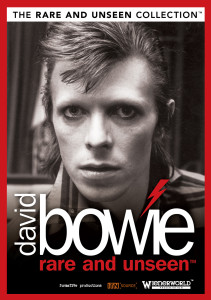 Let’s start with the obvious. David Bowie is a genius. Musician, composer, actor, and mime, his versatility is always impressive. He defined — and very nearly created — glitter rock; he was the first white man inducted into the Soul Hall of Fame; he narrated a superb version of Peter and the Wolf; his film performances have ranged from Pontius Pilate to the Goblin King to the most alienated alien in cinematic history.
Let’s start with the obvious. David Bowie is a genius. Musician, composer, actor, and mime, his versatility is always impressive. He defined — and very nearly created — glitter rock; he was the first white man inducted into the Soul Hall of Fame; he narrated a superb version of Peter and the Wolf; his film performances have ranged from Pontius Pilate to the Goblin King to the most alienated alien in cinematic history.
This disc gives us some glimpses of that. But they’re not very clear, and they’re not very well arranged. Essentially, David Bowie: Rare and Unseen is composed of elements from three interviews, edited together somewhat clumsily, along with snippets of live musical performances so brief they’re very nearly painful. Some of the best quotes from the interviews are repeated, in case (perhaps) we weren’t paying attention the first time. Bits of interview with a few other figures are included — musicians with whom he’s worked, as well as some comments from director John Landis, whose film Into The Night featured Bowie. But the main features — if not always the most interesting — are the three interviews with Bowie himself.
There’s an intercontinental interview with Russell Harty, from just after the filming of The Man Who Fell To Earth. In this segment Bowie is — not to put too fine a point on it — stoned off his ass. Distracted, unfocused, uncomfortable and rambling, his answers don’t always match the questions he’s been asked.
Then there’s a more recent segment, Bowie seated cross-legged and jovial, discussing his travels and his years of drug use and marveling that he’s survived it all. He feels that he learned valuable lessons from his drug experiences, and he’s glad he spent the time as he did, even while he admits to being uncomfortably aware that this could be construed as a recommendation. He makes a pretty good case for personal choice and personal responsibility, and he’s both engaging and amusing.
And there’s a chatty, slightly dull interview with Janet Street Porter, filmed backstage while Bowie’s waiting to go on. Here again he’s distracted, but it’s purely professional. His mind is more on the performance ahead than on the woman chatting him up.
More enlightening — and also, regrettably, more brief — are the comments from musicians with whom he’s worked on one project or another. But ultimately, this documentary is deadly dull. Dedicated fans will appreciate certain aspects of the production; people not already familiar with Bowie’s work are unlikely to find themselves moved by this DVD to seek out more.
(Wienerworld, 2010)
